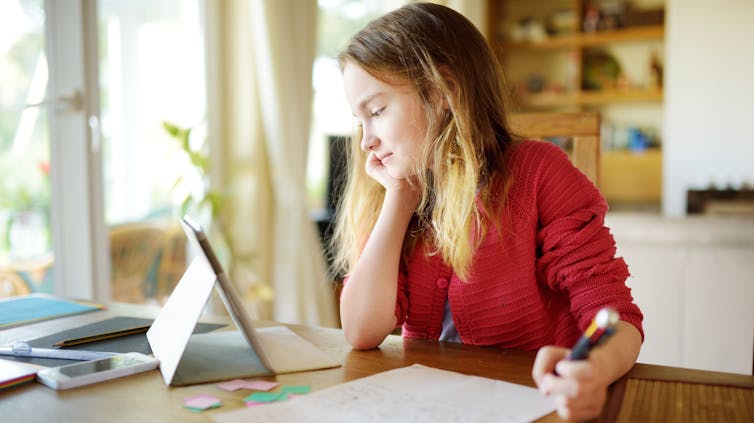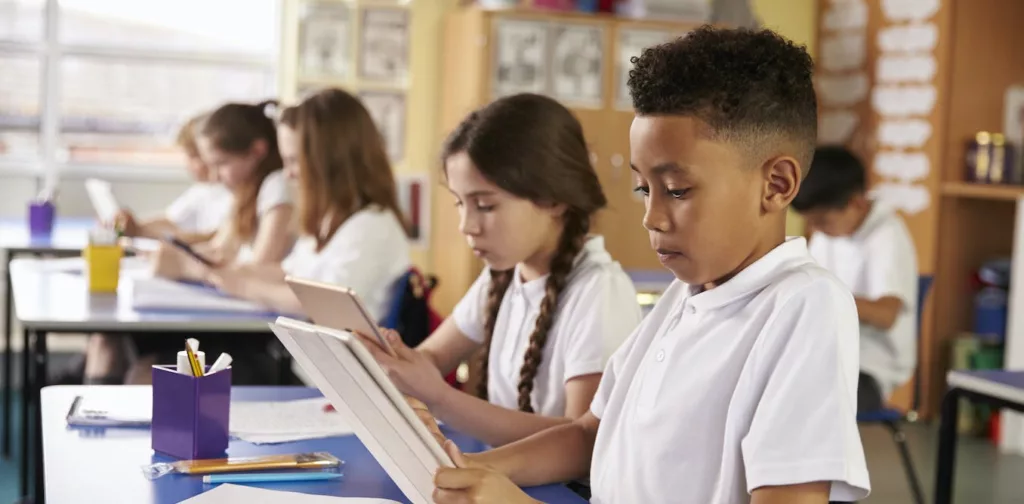[ad_1]
Children’s finding out development has slowed considerably all through the pandemic, approximately equating to a reduction of around 35% of the normal understanding in a school calendar year, according to a new review.
The investigation drew on 42 reports printed involving March 2020 and August 2022 from 15 distinct large- and center-income countries (whilst most of the knowledge was from the US, the United kingdom and the Netherlands).
The researchers observed that the studying deficits were being better in maths than in studying. They appeared early in the pandemic and remained steady, neither worsening more than time (as some had feared) nor noticeably strengthening.
So it seems that initiatives aimed at restricting the adverse outcomes of faculty closures, this sort of as on the net finding out assets for household education, have been successful in stabilising the first impression of disruption to children’s official training.
At the identical time, it would seem that we haven’t however found means to assistance kids to attain the stages of accomplishment we could possibly have predicted in regular instances. And this is significantly real for small children from lessen-money families.
A widening hole
This review confirms worries expressed earlier in the pandemic by charities like the Sutton Have faith in that socioeconomic inequalities in finding out development would maximize. For illustration, the change to on the web studying through university closures developed extra boundaries for some small children, exactly where the availability of desktops and net obtain was not clear-cut, or even not possible.
An investigation by the Training Policy Institute in 2017 located that at that time it would just take the United kingdom 50 decades to near the attainment gap involving pupils from disadvantaged backgrounds and their wealthier friends.
The National Foundation for Academic Analysis, a charity that conducts investigation into education and learning and children’s products and services, believed that the influence of poverty on children’s discovering in advance of the pandemic was at minimum twice as great as the impact of COVID’s disruption to education.
Nonetheless, it now would seem very clear that the hole has widened further more, and is very likely to get even more time to near.
Examine far more:
COVID faculty restoration: is England’s £1.4 billion capture-up plan a superior concept?
Misplaced emphasis
But is this the appropriate way to consider about the challenges confronted by schoolchildren and their teachers? The concentrate on “lost learning” and the benchmarking of children’s attainment to amounts of pre-pandemic effectiveness neglects an uncomfortable fact.
A lot of little ones have been essentially afflicted by the pandemic in other ways that will impact their potential to successfully learn, and which are not essentially currently being dealt with by the emphasis on “catch up” discovering.
For example, in November 2022 we released a white paper on the effects the pandemic has had on positivity, enthusiasm to master, resilience, and self-efficacy among the little ones in essential stage 2 (years 3–6).
Self-efficacy refers to a person’s perception that they are capable of being effective in tasks or objectives that they established for by themselves. There is substantial proof linking self-efficacy with educational accomplishment.
We observed that whilst all 4 of these places ended up negatively afflicted to some extent, it was children’s perception of self-efficacy that was most strongly impacted. And though all parts have revealed smaller indications of restoration, self-efficacy remains notably minimal.
For the youngsters in our investigation, self-efficacy referred to the perception that they could be effective not just with finding out responsibilities, but also in terms of handling their thoughts at school and their interactions with some others in the classroom. The reduction in self-efficacy at school was obvious irrespective of socioeconomic status.

MNStudio/Shutterstock
So why could possibly students’ self-efficacy have experienced as a consequence of the pandemic? In accordance to psychologist Albert Bandura, there are many approaches in which we create our perception of self-efficacy. A person is via immediate knowledge of achievements in an atmosphere that can facilitate this. This is what universities can do – they control mastering duties to give small children the knowledge of getting profitable.
A next way self-efficacy is designed is by using social comparison by seeing many others like us staying successful. This increases our feeling that we can also succeed. The social isolation that youngsters confronted through lockdowns minimal their skill to see other small children like them engaging in finding out and relate to their achievements.
Eventually, an critical avenue to self-efficacy is becoming with other individuals who can reframe any destructive reactions we may have to understanding, these as failure or stress (for illustration, looking at nerves as a positive, and sensation fired up about a new obstacle somewhat than worry). Get hold of with instructors is crucial in supporting little ones to reframe their thoughts in these techniques.
Examine a lot more:
Coronavirus school closures effect 1.3 billion little ones – and distant discovering is growing inequality
At dwelling and at faculty
Although it is vital to recognise and document the tutorial toll that the pandemic has taken on children’s learning, element of the motive our tries to rectify factors have been unsuccessful might be simply because we are failing to get into account the wider psychological consequences that our small children have seasoned.
If we want to see young children attain, instead of discussions about “learning loss” and “falling behind”, we require to aim some of our endeavours on training them that they can have self-confidence in their capabilities.
Instructors, and mothers and fathers far too, can do a great deal to rebuild children’s wellbeing and enthusiasm to study by addressing their fundamental psychological wants. This could possibly include things like enabling them some command about what they do (autonomy), establishing a nurturing natural environment that the child feels related to (relatedness), and enabling them to encounter being successful (competence), potentially by diversifying evaluation methods.
[ad_2]
Source link
Meet Our Successful Graduates: Learn how our courses have propelled graduates into rewarding
careers. Explore their success stories here!
Discover More About Your Future: Interested in advancing your teaching career? Explore our
IPGCE, MA, and QTS courses today!

Explore Our Courses: Ready to take the next
step in your education journey? View our
comprehensive course offerings now!

